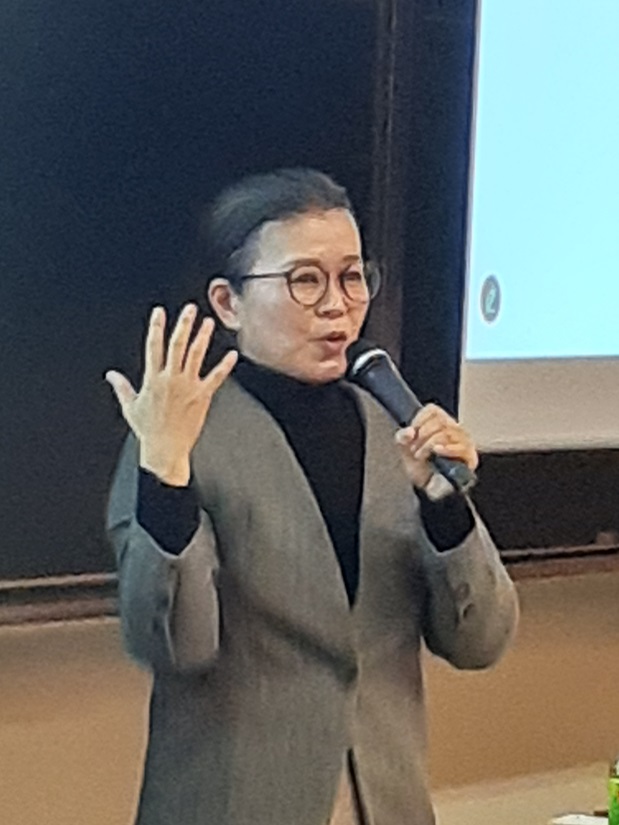Seminar Report: “Memories of the 2011 Fukushima Nuclear Accident: Lessons from 3.11”
Date: Thursday, January 23, 2025
Time: 16:20 – 17:50
Format: Hybrid
Venue: Theater Classroom, Comprehensive Research Building 1, Saitama University
Participants: 50 (including 25 online participants)
Speaker: Ms. Chia Yoshida (Freelance Writer)

Profile: Since the Fukushima Daiichi nuclear accident, she has been actively involved in interviewing and supporting victims and evacuees. Her publications include Memories of the 2011 Fukushima Nuclear Accident: Lessons from 3.11 (Iwanami Junior Library), The Lonely Stronghold: The 3.11 Story of Futaba District Firefighters (Iwanami Shoten), Reportage: Mother-Child Evacuation (Iwanami Shinsho), and After Fukushima: Lives After the Nuclear Accident (Jinbun Shoin). She has also co-authored The White Paper on Nuclear Evacuation (Jinbun Shoin). Her book The Lonely Stronghold received the 42nd Honda Yasuharu Nonfiction Award, the Grand Prize of the 2020 Hizumi Kazuo Information Dissemination Promotion Award, and the 63rd Japan Congress of Journalists (JCJ) Award.
On January 23, 2025, the Disaster × Diversity Seminar, titled Based on “Memories of the Nuclear Accident: Lessons from 3.11”, was held, hosted by the Resilient Society Division of Research Center for Social Transformation and the Diversity Promotion Center at Saitama University, with support from the Kanto Regional Committee of the Natural Disaster Research Council.
During the seminar, Ms. Yoshida, who has continuously supported victims and evacuees of the Fukushima nuclear accident while documenting their experiences, shared insights into the challenges brought by the nuclear accident and the difficulties that persist today. And Ms. Yoshida raised the question of what constitutes the damage caused by the nuclear accident. She explained that beyond the direct radiation contamination and its health effects, the forced displacement from familiar lands, the necessity of evacuation, and the consequent loss and deprivation of communities and culture should also be recognized as significant damages.
Additionally, she posed the question of what constitutes the “perpetration” of the accident. Apart from causing the accident itself, she highlighted the failure to reflect on it, the lack of information disclosure, the silencing of victims’ voices, and even the stance of “not knowing” as forms of indirect perpetration.
At the end of the seminar, Ms. Yoshida shared the words of a young girl who evacuated due to the nuclear accident:
“It is being erased as if it never happened, but I really don’t want that to happen. That’s why I am doing what I can, getting involved in support activities, and sharing my story. I strongly feel that the memories of this event are fading at an alarming rate.”
She concluded by urging participants to continue thinking about the Fukushima nuclear accident and to remain engaged with the issue.
Since this seminar was also part of the Diversity Welfare Studies course, both students and general attendees participated simultaneously.
Participant Feedback (Excerpts from the Survey)
- “I appreciated the opportunity to hear firsthand accounts from victims of the Fukushima nuclear accident and to learn about the structural issues of perpetration.” (General participant)
- “This was a highly informative lecture that presented the unique struggles, suffering, and challenges faced by individual victims of 3.11(Fukushima nuclear accident). Ms. Yoshida’s passionate concern for the affected areas and people, combined with rich data, made it clear that the problems are far from over.” (General participant)
- “Listening to the talk deepened my knowledge of the nuclear accident and heightened my sense of personal involvement. The discussion on the structural understanding of the accident—considering the roles of perpetrators, victims, and bystanders—made me realize that there is no single correct perspective. One key takeaway was that future generations of children could be the true victims. This made me reflect on my responsibility as an adult to protect their rights.” (Student)
- “I knew that the impact of the nuclear accident was extensive, but this seminar made me aware that even today, some people are still unable to return home. Imagining what it would be like if I were told that I could not return to my hometown for 100 years, I realized that it would mean the loss of not just contemporary life but also the history and culture of generations before me.” (Student)
